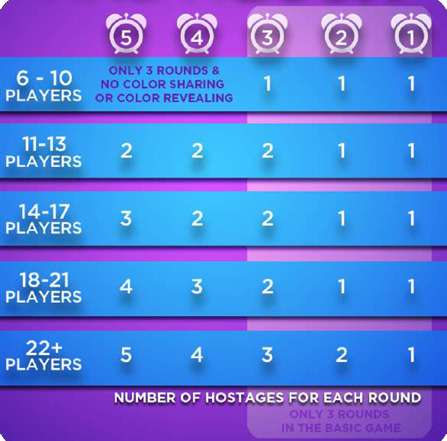Welcome to…
Two Rooms and a Boom
thanks besjbo for the rules
Two Rooms and a Boom is a fast-paced social deduction game where you must negotiate your team to victory to prevent - or guarantee - an assassination attempt, while you, your teammates, and your enemies are split between two rooms that cannot communicate.
Gameplay
- Two Rooms and a Boom has two teams, the Blue Team and the Red Team. The Red Team is trying to kill the President. The Blue Team is trying to stop the Red Team. Both teams have the same number of players, and a few characters have their own win condition.
- To set up the game, everyone gets a character, and is randomly assigned to one of two rooms that cannot see each other. From there, the game goes like this:
- Everyone gets to chat! Figure out who you trust, who you don’t, and make plans. You may even show players your token so that they know for a fact what you are! More on this below. You will have a limited number of private “meetings” per round. To meet with someone, simply create a private thread with them. Note that you cannot speak outside of a meeting while in one.
- Each room will decide who they want to be their Leader. At the end of each round, each Leader chooses some number of players (their “hostages”) to send out of their room and into the other room. Most of the day’s planning and politicking will revolve around this critical decision.
- With the hostages swapped, the next round begins! The game consists of five rounds, each of which is faster-paced than the last, but all work the same way.
- At the end of the 5th and final round, after the final players are swapped between rooms, the Bomber explodes, and the room goes boom. If the President is in the same room as the Bomber, the Red Team wins. Otherwise, the Blue Team wins. That’s the game!
During the Round
- The first round will last 36 hours, and everyone has 5 meetings. Each subsequent round will have one fewer meeting and be 6 hours shorter, until the final 12 hour round where everyone has 1 meeting. Meetings with more than 2 players cost 1 meeting per extra player.
- You may do absolutely anything you want as long as the rules say you can (and as long as you are nice!), including revealing some or all of your role card. Role cards in this game are color-coded by team, so if you want, you can reveal your color without revealing your character. If you wish to reveal any part of your card in any channel of your choice, tag me, say what you are revealing, and share the information. This works on honor code since IRL you would physically reveal the card - if you tag me and lie, you are cheating and this is an integrity breach, so please don’t.
- Some characters care about specific types of reveals.
- Some refer to a card share: this is when you and and one other player agree to look at each others’ characters at the same time. For example, the Negotiator can only card share - they aren’t allowed to reveal any part of their card publicly or privately unless it is a one-on-one full info trade.
- If you wish to card share, please tag me and say you are card sharing with X so it is clear that you are mechanically card sharing. Once you have both tagged me saying so, give your information to each other.
- Other abilities refer to a color share, which is like a card share, but you each only reveal your color to each other. The rules are the same, tag me and say you are color sharing with X, and then share the information. Both of these can only be done in a one-on-one meeting (since otherwise there’s no way to specifically reveal to one player).
- You can also just choose to reveal some or all of your card, no strings attached, in private or public. As before, tag me to do this so that it’s easy to verify your honesty. (Don’t use this to bypass card sharing rules and abilities)
Choosing a Leader
- At the beginning of the game, the Blue and Red Ambassadors each have the power to appoint a Leader of their choice in the room they begin the game in.
- If you don’t like their choice, or you just don’t want to wait for them to decide, then you can nominate someone else to be the new Leader.
- You cannot nominate yourself, it has to be someone else. If the majority of the room raises their hand to vote in their favor, they are the Leader now!
- The Leader can unilaterally decide they don’t want to be the Leader anymore, and appoint a new Leader. They can do this at any time.
- There are no limitations on the number of nominations and votes possible except that a removed Leader cannot become Leader again in the same round (regardless of whether they abdicated power or were usurped).
- Unlike mafia, there are no ties or vote tallies: the moment any player has a majority of votes on them, they are installed as Leader, and if a future vote passes by any margin, another Leader is installed.
- As soon as you vote, it counts, so you can vote privately if you want but I will update it as soon as I see it (it won’t count until you or I publicly display it, so consider voting publicly if you’re playing footsie with the deadline).
- Your vote is never locked in before a majority is reached - vote and unvote as you please.
- I will allow conditional votes, such as “If Eevee is nominated I vote for her”, or “If Jimothy is nominated I vote for him unless Eevee or Chris is currently the Leader”.
- The moment that a player has sufficient votes to make them the Leader, they immediately become the Leader and the former Leader is removed.
- Whoever is the Leader at the moment that time runs out on the round gets to unilaterally choose their hostages.
- Hostages per round differ by player count, if we get the setup I’m looking for, it’s 3, 2, 2, 1, 1. They are allowed to think about it and everyone may advise them, but the choice is theirs alone. Leaders cannot choose themselves as hostages.
-
Once each room has chosen hostages, the two Leaders will meet in the Hallway between rooms, and have a brief time to discuss alone. Then, the hostages swap rooms, and the Leaders return to their rooms.- Note that I will probably change the in between rooms time to match my schedule for the next round to make it feasible for the game to run.
- Leaders remain in power across rounds, but you can always vote them out if the room wants a new one.
Time Chart

The number in the clock is the number of whispers you have. It corresponds to the round number but in reverse. The row of 14-17 players is how many hostages you have in each round, depending on playercount
Characters
It wouldn’t be a social deduction game without a colorful cast of characters with their own special abilities (or would it?). There are hundreds of characters in the game, and I am running the “Cold War” scenario because of course I am. This is what I will run if I get exactly 16 but I’ll still happily run with less.
All of these characters will be in play - unlike other social deduction games you may be used to, Two Rooms and a Boom is less about bluffing and more about choosing who to trust, since you can mechanically confirm yourself to your team, but neither team is in the majority. For those who know the game, yes, I’ve tweaked some of these characters to work better in longform.
Most every role has a // in the middle. This means there’s two variations of each role, one for each team. Also note the four gray characters, which are there for variable setups; I will announce and take feedback on which two of the four will actually be in play.
Characters
President // Bomber
The President is on the Blue Team. If they do not end the game in the same room as the Bomber, the Blue Team wins.
The Bomber is on the Red Team. If they end the game in the same room as the President, the Red Team wins.
Blue Ambassador // Red Ambassador
The Ambassador must play with their card revealed at all times. Unlike all other players, they may move freely between the two rooms. They cannot vote or be a Leader and do not count towards the number of players in a room. They are also immune to all abilities, period, although that isn’t too relevant in this setup because all the abilities care about card sharing, and the Ambassador can’t card share since they have to keep their card permanently revealed.
Each Ambassador has the power to unilaterally appoint the first Leader of the game in the room they begin in. In a live game the first appointment is made by the first player to speak up in each room, but that privileges timezones unfairly in longform, so I’m giving the power to the Ambassadors.
Blue Agent // Red Agent
Once per round, the Agent may reveal their card to a player and force them to card share with the Agent.
If the Agent does this while in a meeting, the other player must immediately (before they post again) card share with the Agent. If the Agent does this in public, they must publicly reveal themselves to be the Agent, and their target must open a thread to card share. Forcing a player to do this costs the Agent a meeting, but not their target. If the target is offline or otherwise cannot reveal due to something that isn’t their ability, then I will reveal it for them at the end of the round.
If the Agent targets a player who is not allowed to card share due to an ability, they must honestly inform the Agent as such instead and the Agent’s power is wasted for the round.
Blue Negotiator // Red Negotiator
The Negotiator may not reveal any of their card except in a card share. They cannot color share, or unilaterally reveal any of their card. If anyone asks you to do any info sharing other than a full trade of your card for their card, you must decline. Note that this means you can’t ever show your card to the Ambassador, since they can’t card share.
Blue Coy Boy // Red Coy Boy
The Coy Boy may not reveal any of their card except in a color share. They cannot card share, or unilaterally reveal any of their card. They are never allowed to reveal their character - the only info share they are allowed to perform is your color for their color. Like the Negotiator, you can’t show anything to the Ambassador, since they can’t color share. Even if the Agent tries to force you to share with them, you must tell them that an ability is preventing you.
Blue Spy // Red Spy
The Spy’s card is the opposite color of their team. The Blue Spy has a red card and the Red Spy has a blue card. If you card share with someone, they will see your real character, but if you only color share, they will be deceived.
Capitalist // Socialist
The first time each round that the Capitalist card shares with someone, that player immediately exchanges their card for a vanilla Blue Team card. They are now on the Blue Team and have no ability. Their power doesn’t work on the Socialist, President, Bomber, or Grey characters.
The first time each round that the Socialist card shares with someone, that player immediately exchanges their card for a vanilla Red Team card. They are now on the Red Team and have no ability. Their power doesn’t work on the Capitalist, President, Bomber, or Grey characters.
Blue Shy Guy // Red Shy Guy
The Shy Guy is never allowed to show any part of their card to anyone, under any circumstances. Even if the Agent tries to force you to share with them, you must tell them that an ability is preventing you.
This role can feel a bit isolating – nobody is going to trust you, at first! But in a way, you are the essential member of your team. No abilities can touch you. You can’t get converted or join the cult, you know from the start you need to win with your team. You know that nobody else is your team’s Shy Guy, so it’s everyone else’s job to prove themselves to you, and it’s your job to demonstrate your loyalty by playing hard for your teammates.
MI6
MI6 is a Grey character, not aligned with either team. If MI6 card shares with both the President and the Bomber by the end of the game, they win.
Grey Team characters like MI6 have win conditions that require them to work with both teams. Players are strongly encouraged to negotiate with MI6 for information and votes in exchange for getting them what they need.
Cult Leader
The Cult Leader is a Grey character. They start with the “cultist” condition. Anyone who card shares with a cultist becomes a cultist. If the Cult Leader gets blown up by the Bomber, all cultists kill themselves and lose the game. The Cult Leader wins if they stay alive.
This is an additional win condition - cultists keep their character, ability, and team, but now they also need to keep the Cult Leader alive. Fortunately, it’s not too hard to spread the good word. Note that if the President joins the cult, the entire Blue Team must protect the Cult Leader, because if the Cult Leader dies, the President will kill themselves and the Blue Team will lose. This gives the Red Team another win condition… as long as they aren’t in the cult themselves. The Cult Leader themselves just wants to live, and everyone is encouraged to negotiate with the cult to win their votes.
Gambler
The Gambler is a Grey character. At the end of the game, guess which team is about to win (or neither). If you guess right, you win.
The Gambler reveals at the end of the final round. They can bet neither team will win if they think the Mastermind will win. This is usually a bad bet, but a very funny one.
Mastermind
Mastermind is a Grey character. Their card is half blue and half red, so they may honestly claim to have a blue card, or a red card, or a grey card. At the end of the game, before characters are revealed, the Mastermind guesses what team every player started on. If they guess everyone right, they win, and everyone else loses.
Some Grey characters like MI6 want to cooperate, and others are just villains. Both teams must be careful how much information they share, because the Mastermind is playing against them both.
P.S. This is the hardest character to win as. Embrace your role as the bad guy: if you win, it will be amazing, if not, you gave them a good scare.
Playerlist
- Bionic
- Hazard
- Marshal
- tutuu
- Jane
- Kiiruma
- Zug
- Daeron
- CarrotyReaper
- N.1
- Ash
- Leafia
- Whysper
- thepigeonnyc
- catbae
- Hippo
- Kanave
- Brakuren
- spookycat
Specs
- Atlas
- Canping
- benguined




 this looks pretty cool
this looks pretty cool